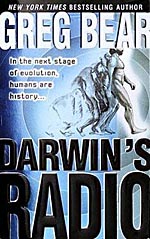
![]() JohnBem
JohnBem
3/27/2016
![]()
Good Lord, this was a long novel. Not because of its 500+ page count, but because of the unvarying flat tone of the writing. I did like Darwin's Radio, but mainly because of the ideas it contains. It is a story about the advent of the next stage of human evolution, which comes about not from external forces, as it does, for example, in Arthur C Clarke's brilliant classic Childhood's End, but from within our own selves as millennia-dormant "junk" DNA becomes reactivated because of societal and environmental pressures. A fascinating idea. I also like that Greg Bear showed that the novel's scientists, as they attempted to understand the changes that were happening to the human race, had to deal with politicians and the opinions of the public; in short, he showed that science in it's practical day-to-day pursuit doesn't take place in a vacuum but must contend with numerous societal forces. All very good ideas. But the book became a bit of slog for me in the back half because of that flat writing I mentioned above; especially so in the book's last third when it became pretty crystal clear how things were going to end up and there's still like 160 pages to go. Bear writes of a global epidemic, riots, a high-profile political assassination, the imposition of martial law, in the same dry podium-lecture style that he uses for his pages of genetics-dense scientific exposition. Big things are happening in this book, world-changing, species-altering events, but there is practically no sense of fear, tension, dread, at all in any of its hundreds of pages. For all of its grand human drama and globe-spanning catastrophes, this is an oddly emotionless story. The ideas in the book are impressive, the scope of events is impressive, but the writing, while not outright bad, is less than impressive. So, a book that would normally get a four-star review from me is knocked down to three because of writing style. A worthwhile read, but not one I'm planning to revisit.